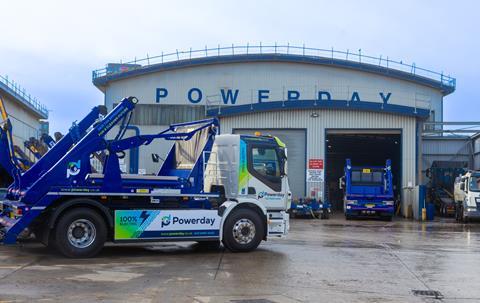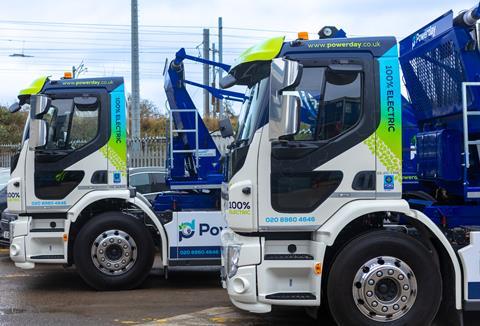One of the biggest challenges in decarbonising the waste management sector is reducing emissions from transport, particularly the transition of HGV fleets to low-carbon alternatives. While the exact solution remains uncertain, one thing is clear: change is inevitable, and we must seize the opportunity to make progress.

The UK government’s Decarbonising Transport strategy outlines a phase-out of sales of new fossil-fuel vehicles by 2035 for vans and HGVs under 26 tonnes GVW and by 2040 for HGVs over 26 tonnes. However, the Climate Change Committee estimates that only a third of the necessary 2030 emissions reductions are covered by credible plans. Waste fleet managers face increasing pressure to adapt, yet many are unsure where to begin.

One way to do this is to start actively managing carbon footprint and set net zero targets for Scope 1 (fleet and plant) and Scope 2 (purchased electricity) by 2040, with interim milestones. We actively started doing this in 2021 and set the following interim milestones:
- 20% reduction by 2023 (exceeded with a 25% cut)
- 35% by 2026
- 50% by 2030
While setting out the roadmap is the easy part, executing it is far more complex. It is tricky to navigate the best low-carbon replacements, but with investments and operational changes, it is possible.
Early steps: electrifying the fleet
One of the first steps worth taking is to look at replacing combustion engine company cars with electric vehicles (EVs). While range anxiety and inadequate UK charging infrastructure does pose challenges, many companies have navigated the transition successfully. Employees adapt, and as the number of fast chargers across the UK has grown, concerns will ease.
The next stage is to investigate transitioning small vans and pickup trucks to electric. While van ranges remain limited, this shift, though incremental, will help keep business looking to hit those targets, on track.

While electrifying cars and smaller vehicles is a fairly well-trodden path, taking on larger vehicles such as electric skip loaders is less certain. However, to fully embrace decarbonisation, it is an essential step to take. I would strongly recommend undertaking a trial before fully committing to purchasing the vehicles, to ensure it works for the business. We ran our own short-term trials in 2022/23, before ordering two fully electric Volvo skip loaders in July 2023, the first of their kind in London.
The vehicles, which arrived in January 2024 on a five-year lease, have performed well despite minor teething issues. While range remains the only real limitation, they have matched the performance of diesel models, demonstrating that electric skip loaders can be a viable alternative, at least in the right conditions.
To bridge the gap while awaiting technological advancements, it is also worth looking at other options for decarbonising the fleet such as Hydrotreated Vegetable Oil (HVO) fuel. While some research shows this can be problematic with vehicle breakdowns, many companies have successfully adopted HVO. While HVO is more expensive than diesel, by introducing it into new vehicles and using mobile refuelling, it has delivered the majority of our further 5% carbon reduction in 2024, now standing at a 30.5% reduction, making it a key short- to medium-term solution.
Driving change: fleet decarbonisation strategy
In order to take structured action and make real change, its important to have a team in place to lead the strategy. A fleet decarbonisation strategy team focuses on:
- Immediate actions – deploying available low-carbon solutions
- Optimising our existing fleet – maximising efficiency
- Planning for the future – investing in long-term sustainability
This structured approach maintains momentum while ensuring the continued provision of high-quality service to clients.
Our journey continues with ongoing EV and HVO trials, alongside exploring alternative technologies. We also remain committed to rail and canal transportation, which offer promising emissions reductions. A key focus now is on driver behaviour, with integrating environmental sustainability into training and building on our existing efforts around efficiency and safety. As part of our Carbon Working Group, we will extend carbon and climate training to the transport team this year. Additionally, in 2025, we will set a Scope 3 net zero target (covering our indirect emissions). This means evaluating supplier choices and procurement strategies to align with our fleet decarbonisation goals.
Collaboration is key
Decarbonising a busy transport operation is no easy task. The day-to-day demands of managing a fleet can easily take priority, which is why fleet decarbonisation must be embedded within company-wide strategies.
Success also depends on industry collaboration. We actively engage with suppliers, clients, and organisations such as Logistics UK’s Route to Net Zero because we cannot achieve this alone.
The path to fleet decarbonisation is uncertain, but waiting for perfect solutions isn’t an option. By taking bold steps, learning from trials and remaining adaptable, we are making meaningful progress toward a more sustainable future for waste transportation.
- Powerday is one of London’s leading waste management and recycling businesses with sites across the capital.













